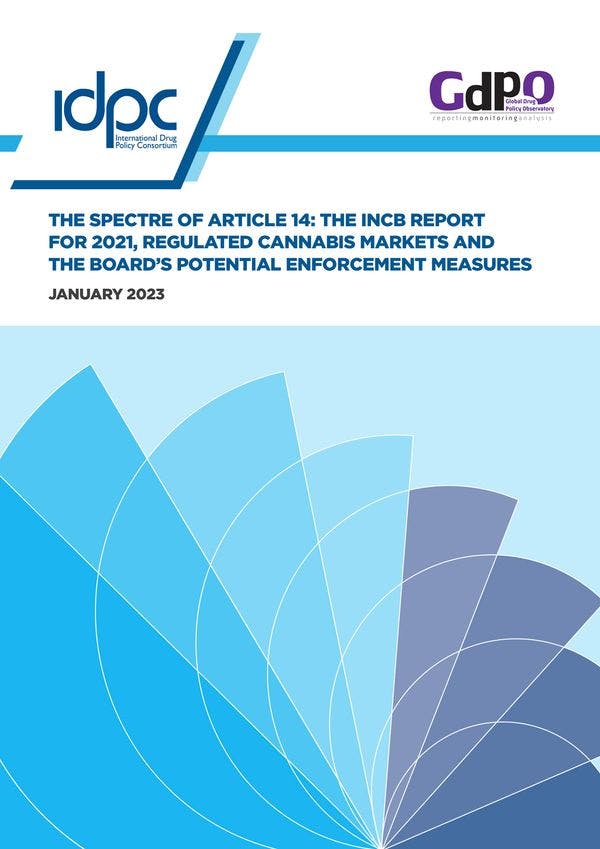The spectre of article 14: The INCB Report for 2021, regulated cannabis markets and the board’s potential enforcement measures
In its Annual Report for 2021, the International Narcotics Control Board (INCB) presents an impressive overview of the state of international drug control relative to the provisions of the UN drug control conventions. In so doing, it continues to demonstrate a welcome adjustment of position on a range of issues relating to human rights and a more general growing and implicit appreciation for the operation of the global drug control regime within a web of interlocking – and often conflictual – regime complexes.
Within this context, and a multilateral system where treaty breaches in one form or another are an unexceptional feature of international law, the INCB is playing an increasingly pivotal role in responding to the adoption of regulated cannabis markets for adult recreational use by a growing number of parties, counter to the provisions of the Conventions; a topic to which the Report for 2021 devotes significant attention.
Although not mentioned explicitly within the Report in relation to cannabis, recent comments by the INCB President in relation to regulated markets highlight the Board’s power to deploy enforcement measures if, under Article 14 of the Single Convention, it has ‘objective reasons to believe that the aims of this Convention are being seriously endangered by reason of any Party, country, or territory to carry out the provisions of this Convention’.
Article 14, as with Article 19 of the 1971 Convention, constitutes what can be regarded as a fourstage escalation ladder and accompanying range of actions that begin with dialogue and consultations and increase in severity depending on the responses of national governments to INCB requests and proposals. Ultimately, as part of a ‘name and shame’ process, having drawn the attention of the Parties, the Commission on Narcotic Drugs (CND or Commission) and the Economic and Social Council (ECOSOC or Council) to the matter, the Board may recommend an import and export embargo on licit drugs from or to the country concerned. Although never reaching this stage, this is often considered the Board’s ‘nuclear option’. Such potential measures can be seen as remedial and preventative, performing both a deterrent and corrective function.
The confidential nature of much of the Article 14 procedure makes analysis of possible implications challenging. Nonetheless, it is clear that its application relative to regulated cannabis markets would take the Board and Parties to the Conventions into complex and uncharted territory.
In responding to any implementation by the Board of the Article 14 procedure, it seems unwise for governments to simply dismiss its mandate or seek legal loopholes. Both actions are not cost free, both in terms of drug control and respect for international law more broadly. Recognising the benefits of regulated cannabis markets, national authorities would be better advised to accept that the treaties are not infinitely flexible and work towards regime reform and modernisation. Similarly, considering the contemporary political realities of the issue at hand, the INCB should avoid a rigid ‘treaties say no’ approach, carefully weigh up its deployment of Article 14 and use, in close consultation with Parties, its considerable expertise to consider all options available to resolve increasing systemic tensions.
Previous reports in this series:
- (Re)framing regime performance: A critique of the INCB report for 2020
- The INCB on human rights: A critique of the report for 2019
- The INCB on cannabis: A critique of the report for 2018
- IDPC response to the 2017 INCB Annual Report
- IDPC response to the 2016 INCB Annual Report
- IDPC response to the 2015 INCB Annual Report
- IDPC response to the 2014 INCB Annual Report
- IDPC response to the 2013 INCB Annual Report
- IDPC response to the 2012 INCB Annual Report
- IDPC response to the 2011 INCB Annual Report
- IDPC response to the 2010 INCB Annual Report
- IDPC response to the 2009 INCB Annual Report
- IDPC response to the 2008 INCB Annual Report
- IDPC response to the 2007 INCB Annual Report
Topics
Regions
Related Profiles
- International Narcotics Control Board (INCB)
